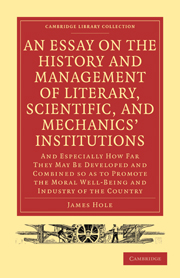 An Essay on the History and Management of Literary, Scientific, and Mechanics' Institutions
An Essay on the History and Management of Literary, Scientific, and Mechanics' Institutions HISTORY.
The year 1851 will ever be memorable as the epoch of the Great Exhibition. We then witnessed, collected into one focus, the best results of the skill, taste, and industry of the world. Different nations, no longer rivalling each other in military contests or diplomatic chicane, tried whether peace could not show more glorious victories than war! Each learnt by comparison its peculiar merits or special deficiencies, and every member of that Congress of Nations was benefited by the lesson.
Of the many consequences flowing from this grand organisation of the products of industry, we note the steady rise of a feeling for the industrial education of the people in the minds of those whose interest in the Exhibition was not confined to the temporary amusement of a few hours. If so much had been done without any special culture on the part of the people, how much more might be done with it? If we beheld the labours of our superior workmen only, developed by the energy of the capitalists, what might be anticipated when all our people should have received the benefits of instruction? Moreover, with such wonders of skill and ingenuity before us, applied to everything that could minister to human need, surely the knowledge that enabled us to achieve all this was of some importance, and ought to meet with befitting treatment at our hands. As mere knowledge, it was as dignified as the lore taught in our Colleges and Universities, and in its direct influence on human happiness the two could not for one moment be compared.
To save this book to your Kindle, first ensure [email protected] is added to your Approved Personal Document E-mail List under your Personal Document Settings on the Manage Your Content and Devices page of your Amazon account. Then enter the ‘name’ part of your Kindle email address below. Find out more about saving to your Kindle.
Note you can select to save to either the @free.kindle.com or @kindle.com variations. ‘@free.kindle.com’ emails are free but can only be saved to your device when it is connected to wi-fi. ‘@kindle.com’ emails can be delivered even when you are not connected to wi-fi, but note that service fees apply.
Find out more about the Kindle Personal Document Service.
To save content items to your account, please confirm that you agree to abide by our usage policies. If this is the first time you use this feature, you will be asked to authorise Cambridge Core to connect with your account. Find out more about saving content to Dropbox.
To save content items to your account, please confirm that you agree to abide by our usage policies. If this is the first time you use this feature, you will be asked to authorise Cambridge Core to connect with your account. Find out more about saving content to Google Drive.